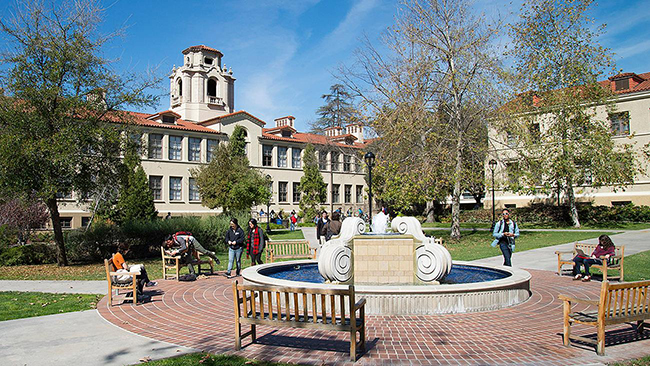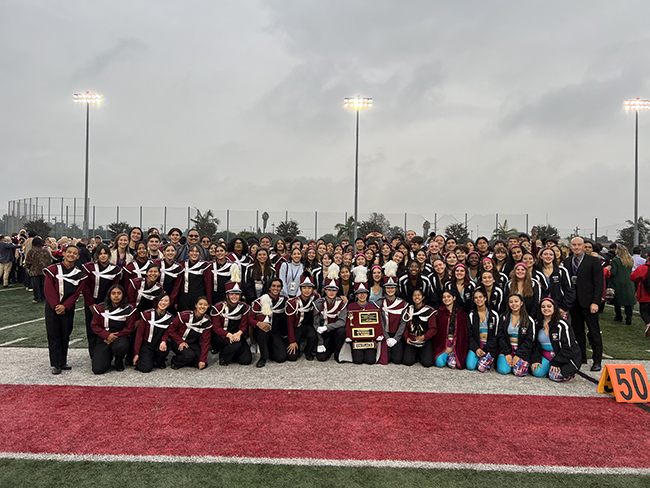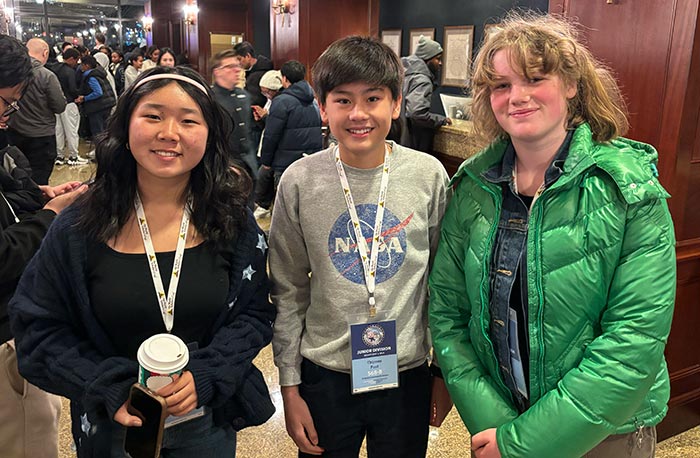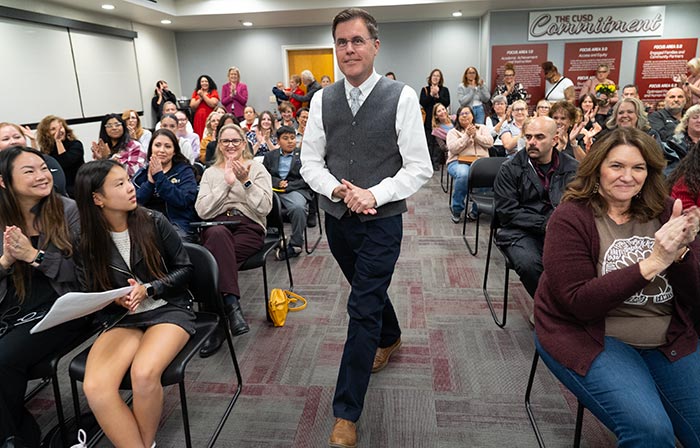Scripps students, faculty protest commencement, draw fire
Statements by students and faculty at Scripps College, outraged that former Secretary of State Madeleine Albright will serve as speaker during this weekend’s commencement ceremony, have prompted a national debate about when it’s appropriate for a college community to protest.
Some question the ethics of Ms. Albright’s decisions while Secretary of State and while stumping for presidential ho
Either way, the outcry has put Claremont’s historic women’s college on the map.
The furor began with an opinion piece by Scripps senior Kinzie Mabon, “Madeleine Albright Has Blood on Her Hands,” posted March 4 on The Student Life website, a publication produced by Pomona College for the Claremont Colleges community.
Ms. Mabon took issue with a comment the diplomat made while introducing Hillary Clinton at a February event. “There’s a special place in hell for women who don’t help each other!” The remark didn’t sit well with female voters, many of whom say they would never vote for a candidate based on their gender.
“I’m deeply disgusted that on the happiest day of my life (up to this point), I have to sit quietly and smile at the cameras of my parents and grandparents while this woman tells me to go out into the world and be amazing, even though according to her, I’m going to hell,” Ms. Mabon wrote.
That’s not the anthropology major’s only concern. She cited, among other acts she considers unconscionable, the diplomat’s failure to support an intervention during the Rwandan genocide, her support of military intervention in Yugoslavia and her support of the financial and trade embargo levied on Iraq by the United Nations Security Council beginning in 1993.
Ms. Mabon called Ms. Albright’s words during a 1996 60 Minutes interview “stomach-turning.” After being asked whether the deaths of a half-million children in Iraq were a price worth paying for the sanctions, the diplomat notoriously responded by saying, “I think that is a very hard choice, but the price, we think, the price is worth it.”
The student concluded her piece acknowledging Ms. Albright’s tenure as the first female US Secretary of State as groundbreaking, but stating that it doesn’t give her “a free pass” when it comes to having waged a foreign policy with a grim death toll.
While many share concerns about Ms. Albright’s actions, articles and Internet posts have proliferated, opining that the protests are indicative of a generation unwilling to listen to anyone with dissenting opinions.
A Los Angeles Times editorial on May 10 called out Ms. Mabon and her like-minded peers in a piece called “Students need to stop being so sensitive and let Madeleine Albright speak.”
The Times editorial board concluded that it’s a good thing Ms. Albright “will be there to broaden the minds of students, who should be exposed to a wide range of opinions and ideas, even those they disagree with.”
This was followed by an opinion piece published in the LA Times on May 12 called “Madeleine Albright a war criminal? Scripps College’s baffling crusade for simple thinking.”
In the latter piece, columnist Meghan Daum called the graduates “aggrieved college students [who] are mewling about commencement speakers whose politics don’t sufficiently hew to the ultra-liberal standards set by the campuses’ most outspoken activists.”
She characterized the Scripps protesters as hyper-reactive, saying they have “responded as if Joseph Goebbels had been raised from the dead and charged with the task of inspiring the class of 2016 to follow its dreams.”
If Ms. Daum’s words strike some as a bit tart, it’s nothing compared with the firestorm of comments posted in most any place the Scripps/Albright controversy is discussed online.
A few people, including one person who commented on the open letter, agree with the protest. “Writing in deep solidarity from Syracuse University,” a poster with the web handle ‘yr’ posted. “This is a much needed principled stance that shows an unwavering commitment to education and what it stands for, truth and justice. Your actions will set the history record straight. War criminals must be denounced, not chosen as inspirational figures for graduating students. Thank you!”
The majority of comments are pejorative. People have referred to the offended Scripps students as “special snowflakes” who require protection from all dissent. Others joke that today’s colleges should opt for non-offensive presenters like kittens and puppies.
“I accidentally made my child’s oatmeal so bland and flavorless that Scripps College said it was an acceptable commencement speaker,” one Twitter wag tweeted. The gag was liked by 339 people and retweeted 11 times.
Asked about those who have made disparaging comments about the Scripps protest, anthropology professor Lara Deeb says she disagrees with what amounts to lambasting a generation.
“I generally don’t pay attention to Internet trolls, but to answer your question, no, I do not think that our students are ‘special snowflakes,’” she said. “The student activism I have seen at Scripps over this past year is a response to structural and institutional racism, and shows me that students care about their college and their society. It demonstrates positive engagement with social justice issues and with the world around them.”
Ms. Deeb, who is chair of the anthropology department, is one of the 28 professors who signed “An Open Letter from Scripps Faculty on Commencement Speaker Madeleine Albright,” posted on the The Student Life website on April 8.
In the piece, the professors expressed anger that Ms. Albright—whose foreign policies in the Balkans, the Middle East, Africa and South America they believe have had disastrous consequences—was selected as commencement speaker. While they say they will sit in the audience at commencement in support of the graduating class, the professors have vowed not to take to the stage to participate in the ceremony.
The COURIER reached out to many on the list, but several declined to speak on the matter, in some cases citing schedules that—given finals and the impending end of the school year—are extremely busy. Ms. Deeb was kind enough to respond.
“One of the problems with commencement speakers in general is that they provide a unidirectional form of communication—there’s no discussion or Q&A afterwards,” Ms. Deeb said. “I was glad to see that Scripps has added an open forum with Albright to the day’s events, and to see that the selection process has been revised to at least ensure broader student participation.”
Some people believe that, however well-intended their actions, the Scripps professors are setting a poor example for the students they mentor.
“Recognizing that a commencement speaker can be less than perfect and still have something to say seems like a pretty basic example of such functioning. But if professors are just as impaired on this front as their students, that’s not just ‘problematic’—it’s an actual problem,” Ms. Daum wrote in her Times piece. “As President Obama said last weekend in a commencement speech at Howard University that came down hard on identity politics, ‘Change requires more than just speaking out…it requires listening to those with whom you disagree.’”
Scripps College has sent out a couple of press releases in response to the kerfuffle. These include one that features excerpts of Ms. Albright’s speech, which will range from “the importance of searching for truths in a confusing world” to “the challenge of working together and collaborating to solve global problems.” In another, Interim Scripps President Amy Marcus-Newhall reaffirmed that the school would be welcoming Ms. Albright to commencement and attempts to distance the Scripps community from the protests.
“Recent media coverage has focused on the faculty and students who have voiced their opposition to Albright as our speaker, resulting in a depiction of the Scripps community as intolerant of divergent perspectives,” she wrote.
“The conversations steered by pundits, bloggers, online commenters and media outlets do not reflect our campus community’s thoughtful response to the differing views,” Ms. Marcus-Newhall continued.
Scripps has 206 graduates this year. The commencement will also feature remarks by a student, physics major Catherin Chiang. The ceremony is Saturday, May 14 at 5 p.m. on the Elm Tree Lawn. Seating, which beings at 3:30 p.m., is open and available on a first-come, first-served basis.
—Sarah Torribio
storribio@claremont-courier.com










0 Comments